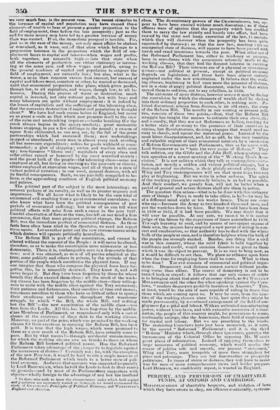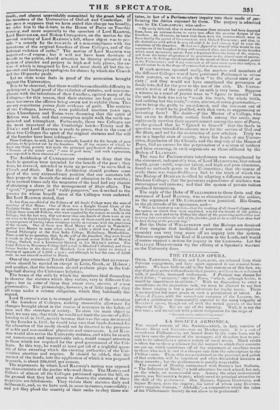PERJURY, AND PERVERSION OF CIIARITABLE FUNDS, Al ' OXFORD AND CAMBRIDGE.
MISAPPLICATION of charitable bequests, and violation of laws which they have sworn to obey, are offences contiuually, sterna- iicant, anti almost unavoidably committed by the groat body of the Members of the Universities of Oxford and Cambridge. If am pesssn supposes that we have stated this charge too broadly, we refer him to the debate in the House of Peers on Tuesday evenimr, and more especially to the speeches tif Lord RADNOR, Lord BRODGHAM, and Bishop COPLESTON, on the motion for the second reading of Lord RADNOR'S bill, whose object w as to pre- vide " a remedy for the two evils of a non-compliance with the intentions of the original founders of those Colleges, and of the habitual violation of oaths." The motion of Lord RADNOR was negatived—of course ; but it will not have been destitute of Wren to the public, should attention be thereby attracted to a system of plunder and perjury in high and holy places, the ox- tent or which is imagined by few, and must shock all but the in- terested and hackneyed apologists for abuses by which the Church and the Oligarchy profit.
Let us state some facts in proof of the accusation brought against the Universities.
It is to be observed, that there would he considerable difficulty in making out a legal proof of the violaticn of statutes, and non-com- pliance with the intentions of their foundera, against many of the Colleges,—for this reason, that their statutes are kept secret, in some invances the officers being sworn not to exhibit them. This smecy constitutes prima facie evidence of guilt. The statutes of two Colleges, however, were published nineteen years ago. when Churchmen and Tories were dreaming that the spirit of
Reform was laid, and that corruption might walk the earth un- molested and triumphant. Fortmiately, these two Colleges are the most important of the Cambridge batch—Trinity and St.
John's ; and Lord RADNOR is ready to prove, that in the case of those two Colleges the spirit of the original statutes and the will of the founder have been infringed—
These Colleges, he said, had been originally founded for the benefit of poor scholars, to be pointed out by the founders. In all the statutes of which be
knew any thing, poverty was made the principal qualification for admission. " Persons of the minor sort," " sons of poor men," and such expressions, were repeated in those statutes ad nauseam.
The Archbishop of CANTERBURY ventured to deny that the funds in question were intended for the benefit of the poor : they were, he averred, intended to train up persons " to serve God in Church and State. But the Archbishop should produce some proof of the very extraordinary position that our ancestors left their property to furnish the means of education to the wealthy; for in ancient times only the magnates of the land had any chance of obtaining a share in the management of State affairs. The " egeni,""pauperes," and " valde pauperes," are described as the persons for whose benefit most of the Colleges were endowed. But Lord RADNOR stated, that No less than one-third of the Fellows of All Souls' College were the sons of meithers of that House. One of them was a Knight Grand Cross of the Guelphic Order, and was gone on an embassy to Constantinople. In Trinity College there were 60 Fellows, who were required by the statute to reside in the College; but the fact was, that not more than one-fourth of them were at any one time to be found residing there ; and many of them could not reside in it, in consequence of having taken situat s totally at variance with the provisions of the statute. One of them was Head Master of a school in Wakefield; another was Master in some other school ; while a third was Professor of Natural Philosophy at the East India College, Iltileybury, Hettfordshire. There could be no question, that, by the will of the founders, they were bound to reside in their respective Colleges. The present senior Fellow of Merton College, Oxford, was a Lieutenant-General in his Illajesty's service. The senior Fellow in Brasenose College held a stall in Hereford Cathedral, and three livings besides in the diocese of Hereford, froin which latter be derived a revenue of upwards of 1,100/. a year ; and although he had the cure of 3,000 souls, he was himself resident in Paris.
One of the statutes of Trinity College prescribes that no conver- sation should be carried on except in Latin, Gteek, or IIebrew ; and another, that the lecturers should perform plays ia the Col- lege-hall during the Christmas holydays.
The tennis of the oath by which the members bind themselves to observe the statutes which they violate, vary in different Col- leges; but in some of them they swear vere, sincere, et scum grammatico. The phraseology, however, is of little import ; they all come under a solemn obligation, which they habitually dis- regard.
Lord RADNOR'S aim is to compel performance of the intention of the founders of Colleges, making reasonable allowance far changes brought about in the course of centuries in the habits of men and the structure of society. To state his main object in brief, we may say, that while he would not limit the income of a Fel- lowship (0 51. in 18:17, merely because that was the sum mentioned by the foutider in 1237, he would take care that funds destined for the education of the needy should not be diverted to the purposes of noble and non-resident pluralists and sineeurists. Lord R.10- NOR would also revise the University statutes, and while he struck out unnecessary and impracticable rules, would compel attention to those which are required for the good government of the Col- leges. In this way, be would at least get rid of a frightful quan- tity of false swearing which the existing authorities of the Uni- versities sanction and require. It should be added, that the amount of the funds, into the application of which it was proposed to search, is about 200,0001. per annum. The arguments by which Lord Ran:soles motion was opposed are characteristic of the patties who used them. The Masters and }chows of almost all the Colleges petitioned against the bill, on the ground that they had sworn to observe the statutes of their respective establishments. They violate their statutes daily and deliberately, and, as we have said, in some instances, unavoidably ; and yet they plead the sanctity of their oaths to obey those sta. Wiest, in bar of a Parliamentary inquiry into their mode of per- forming the duties enjoined by them. The perjury is admitted even by Dr. Copussrorg; who said- " He verily believed, that in most instances these statute* bad been departed from, firm an anxious desire to rainy into effect the !leonine designs of the founders. At all events, he knew that these were the motives which were in force during the orchid of his connexion with Oxford University ; and that, in the deviotious reith which he was identifrl, he h,p.1 olways kept in view the intentions of the /builders. HeIi id ever figured to lthnself what would be the sentiments of the founders if they still remained alive, and looked to the benefits which must seeessaiily accrue from a departure from the letter of the statute, and from the better adaptation of it. provisions to the ;altered state of society. Such were the feelings which operated in the minds of those who enjoyed power at the Universities ; and if ellly continent at all web it made upon thus subject, it should rather be in the shape of commendation than censure.
If such motives operated really, the masters and members of the different Colleges would have petitioned Parliament to revise their statutes, tO as to adapt them " to the altered state of Kis ciety ;"and they would not have sanctioned the perversion of funds intended for the poor to the use of the rich. Dr. COME- STON's notion of the sanctity of an oath is very loose. Suppose a witness in a court, of justice were to " figure to himself" that the oath he took was not to "speak the trut Li, the whole truth, and nothing but the truth,"—rere, sincere, at sensu grammatico,— hat to bring the guilty to punishment, and the innocent out of jeopardy : would he be justified, with that view, in suppressing or inventing facts? No doubt—if the Master el' a College, who has sworn to distribute certain funds among the needy, may righteously sanction their apportionment among the sons of Peers, on the ground that he " figured to himself" that the funds in question were intended to educate men for the service of God and the State, and not for the instruction of poor scholars. Truly we are in a hopeful state of society, when the heads of our Univer- sities, dignitaries of the Church, and the majority of the House of Peers, find an excuse for the perpetuation of a system of robbery and false swearing, in such arguments as those adduced by the Bishop of LLANDAFF. The case for Parliamentary interference was strengthened by the statement, indisputably true, of Lord MELBOURNE, that robust health, great ,.%ealtli, superior talent, and high and pure character.. found an Untimely grave in the Universities; that the course of study there was unprofitable,—a fact to the truth of which the late Bishop of DURHAM testified by adopting a different course in Durham College; that the pecuniary expenditure of students was extravagant awl ruinous; and that the system of private tuition produced favouritism. The reply of the Duke of WELLINGTON to these facts and the statement of Lord RADNOR, was as characteristic of the soldier, as the argument of Dr. COPLESTON was jesuitical. His Grace,. in the plentitude of his ignorance, said— What he insisted on was this—that the working of all these Colleges, and of the system on which they were regulated, was for the benefit of the public ; and that in each and every College the object of the governing authorities teas to carry into execution the will of the founder, just as he would hove done had Fur been living at the present day." But the Duke of Wessasinrost and the Bishops are deceived if they imagine that hardihood of assertion and unscrupulous casuistry can very long stave off an inquiry into the system. Ministers supported the Earl of RADNOR in the Lords, and would of course support a motion for inquiry in the Commons. Let Sir WILLIAM MOLESWORTH try the efficacy of a Speaker's warrant on the University dons.



























 Previous page
Previous page